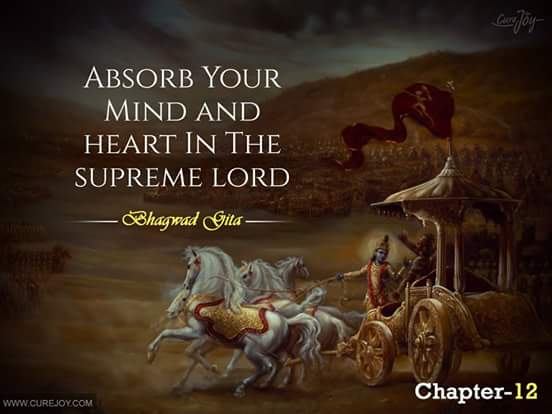Gita : Ch-13. Slo-8 to 12. Slokams and combined - Discussion-6.
10/03/2017
Srimad Bhagavad-Gita :
Chapter-13.( ( Kshetra-kshetrajna-vibhaga-yogam )
Slokam-s. 8 to 12.
(8)
amanitvamadambhitvam ahimsa kshantirarjavam,
acaryopasanam saucam sthairyamatmavinigrahah.
amanitvam = humility;
adambhitvam = pridelessness;
ahimsa = nonviolence;
kshantih = tolerance;
arjavam = simplicity;
acarya-upasanam = approaching a bona fide spiritual master;
saucam = cleanliness;
sthairyam = steadfastness;
atma-vinigrahah = control;
(9)
indriyartheshu vairagyam anahankara eva ca,
janmamrtyujaravyadhiduhkhadoshanudarsanam.
indriya-artheshu = in the matter of the senses;
vairagyam = enunciation;
anahankarah = being without false egoism;
eva = certainly;
ca = also;
janma = birth;
mrtyu = death;
jara = old age;
vyadhi = disease;
duhkha = distress;
dosha = fault;
anudarsanam = observing;
(10).
asaktiranabhishvangah putradaragrahadishu,
nityam ca sama-cittatvam ishtanishtopapattishu.
asaktih = without attachment;
anabhishvangah = without association;
putra = son;
dara = wife;
graha-adishu = home, etc.;
nityam ca = also;
sama-cittatvam = equilibrium;
ishta = desirable;
anishtah = undesirable;
upapattishu = having obtained;
(11)
mayi cananyayogena bhaktiravyabhicarini,
viviktadesasevitvam aratirjanasamsadi.
mayi = unto Me;
ca = also;
ananya-yogena = by devotional service;
bhaktih = devotion;
avyabhicarini = constant, unalloyed;
vivikta = solitary;
desa = place;
sevitvam = aspiring;
aratih = without attachment;
jana = people in general;
samsadi = mass;
(12)
adhyatmajnananityatvah tattvajnanarthadarsanam,
etat jnanamiti proktam ajnanam yadatonyatha.
adhyatma = pertaining to the self;
jnana = knowledge;
nityatvam = eternity;
tattva-jnana = knowledge of the truth;
artha = the object;
darsanam = philosophy;
etat = all this;
jnanam = knowledge;
iti = thus;
proktam = declared;
ajnanam = ignorance;
yat = that which;
atah = from this;
anyatha = others.
Discussion-6. 20 virtues :
I.
1.
Thus these 20 virtues that have been described by Lord Krishna constitute the essence of knowledge for their attributes are the means which opens the way to this highest existence.
2.
Whatever is contrary to these 20 virtues of renowned excellence should always be rejected as it is understood to be ignorance and emphatically antagonistic to truth.
3.
This has been confirmed in by gone ages by great sages and seers such as Vyasa, Vasistha and Parasara.
II.
1.
Having described the characteristics of the ksetra or field of activity, Lord Krishna enumerates the attributes that are required to qualify for knowledge of the nature of ksetra-jna or knower of the field of activity.
2.
The absence of desire for honour and the absence of pride imply both reverence for the Supreme Lord and absence of hypocrisy.
3.
Thus a person becomes righteous by only performing pious activities in accordance with the injunctions of the Vedic scriptures.
To be continued ...





Comments
Post a Comment